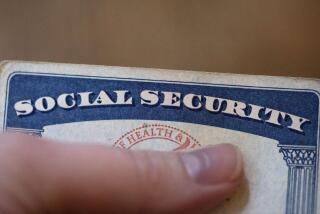Lew won’t commit to paying bondholders if debt limit is breached
WASHINGTON -- Treasury Secretary Jacob J. Lew on Thursday would not commit to paying interest on government bonds if the debt limit is not raised, saying it would be extremely difficult to choose which bills to pay if there is not enough money.
On top of that, he said prioritizing payments on Treasury securities would be “default by another name.”
But some Republicans have argued that paying interest on government bonds would avoid a technical default and minimize the impact of a debt limit breach.
They have pointed to a Moody’s Investor Services report this week that said the credit rating company believed the Treasury would use incoming revenue to continue to pay interest and principal on securities if the debt limit is not raised by Oct. 17.
QUIZ: Test your knowledge about the debt limit
Sen. Pat Toomey (R-Pa.) has pushed the idea of prioritizing bondholder payments and pressed Lew on the point during a Senate Finance Committee hearing Thursday.
“The greatest disruption by far would occur if you were to choose to not pay interest on our debt,” Toomey said. “As secretary of the Treasury, are you prepared to assure us, but more importantly the millions of Americans who are investors in U.S. Treasury securities, and the entire American economy, that under no circumstances will you permit a missed payment on a U.S. Treasury security obligation?”
Lew said he could not make that commitment.
“It is something the president would have to decide. And I’m telling you that it would put us into default if we went to a place where we could pay one bill and not others,” Lew said.
Toomey said he was “shocked that the secretary of the Treasury will not assure the financial markets, American investors and savers, and the millions of people who hold Treasuries that they don’t have to worry about the security of their Treasuries.”
Toomey noted President Obama said this week the administration was making contingency plans in case the $16.7-trillion debt limit isn’t raised by Oct. 17.
After that date, Lew said the federal government would be out of borrowing authority and at risk of default if it does not have enough cash on hand to pay bills on any given day. Lew warned senators the uncertainty over the debt limit already was stressing financial markets.
The Treasury makes about 80 million payments a month and the federal government’s automated systems aren’t designed to prioritize them, he said.
While contingency plans are being developed if the debt limit isn’t raised, he said “the options all are bad.”
“There is no way to make our federal payment system work well to pick and choose what we pay ... so we’re going to be in a place which is uncharted territory,” Lew told Toomey.
“It would not work smoothly. It would be chaos,” he said.
ALSO:
Landlords make a play for rapidly expanding tech tenants
How would Janet Yellen balance jobs, inflation as Fed chief?
USDA may close 3 California poultry plants in salmonella outbreak







